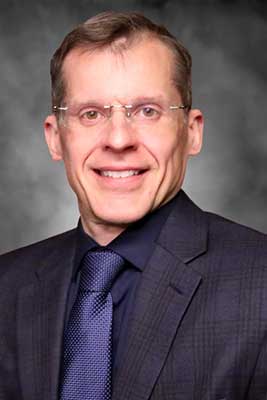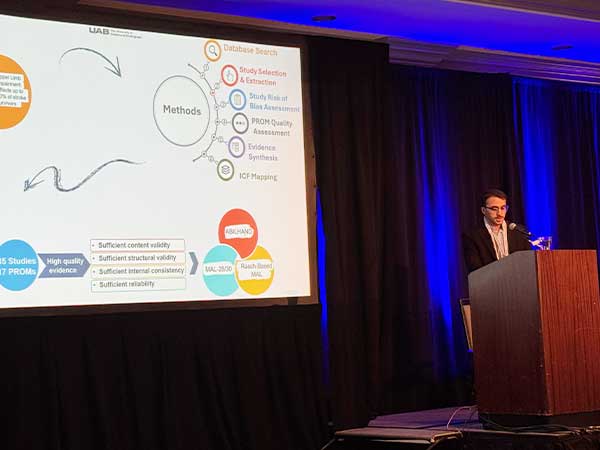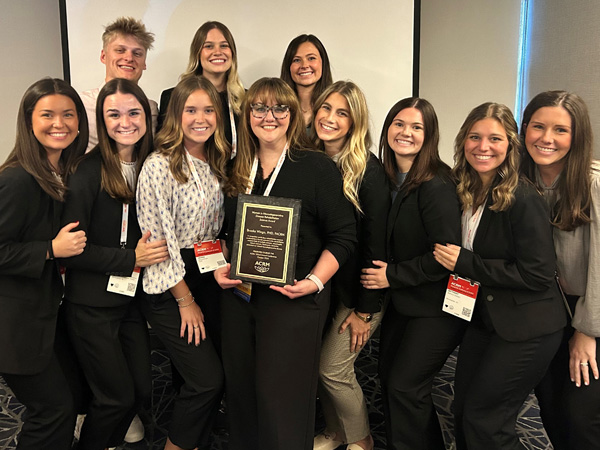 Dr. Keith McGregorDr. Keith McGregor, CEDHARS scientist and director of research in the School of Health Professions, had a “record scratch” moment when talking with other UAB researchers about interventions, or lack thereof, for neuroCOVID. So, they decided to act.
Dr. Keith McGregorDr. Keith McGregor, CEDHARS scientist and director of research in the School of Health Professions, had a “record scratch” moment when talking with other UAB researchers about interventions, or lack thereof, for neuroCOVID. So, they decided to act.
McGregor recently received a grant from UAB’s Health Services Foundation General Endowment Fund, which intends to advance research, educational and clinical interests of UAB, to investigate the effects of neuroCOVID.
The HSF-GEF generally is awarded to researchers in the UAB Heersink School of Medicine, but McGregor’s application for the grant was strengthened with the formation of a working group in conjunction with Dr. Nate Erdmann, associate professor in the School of Medicine’s department of infectious diseases. Dr. Kristine Lokken, director of UAB Comprehensive Neuroscience Center, also got onboard, and they were discussing deficits related to neuroCOVID and possible interventions, when they realized there were none.
As part of the NIH recover trials for post-acute COVID being performed by UAB’s department of infectious diseases, McGregor said the group wanted to look at neuroCOVID and what happens to individuals after reporting neurological symptoms without a recognized diagnosis or avenue for treatment.
“As of right now, for criteria fulfillment, it’s, ‘Are you reporting cognitive deficits: brain fog,’” McGregor said. “And there are two criteria that are impacting your sensibilities, or activities for daily living. That’s a huge unmet need.”
McGregor added that in early 2021, when people started reporting instances of brain fog post-COVID, researchers in psychology at UAB started a neuroCOVID clinic to identify symptoms, which included forgetfulness, fatigue and vague malase. Interestingly, the individuals didn’t have to still be symptomatic of COVID.
“As it turned out, there was this huge number of people that had been added to this database that the neuroCOVID group found,” McGregor said. “And we said, well, what are we doing for them? Nothing. There was no plan. That was the guiding principle. We know there’s a problem, so we have to do something.”
The database currently has over 150 individuals registered, which is just a fraction of patients reporting similar symptoms, and the clinic is still seeing 10-12 new patients per week to this day.
The working group that received the $200,000 pilot grant from the General Endowment Fund is taking the most wholistic approach possible in terms of intervention. Tentatively, the group’s protocol is a 12-week intervention for individuals to come into the clinic three times per week for individually titrated high-intensity interval training.
“Exercise has had a positive impact on reports of cognitive deficits on people with neuroCOVID,” McGregor said. “The mechanisms are still unknown because there’s probably 10 possible vectors of leading hypotheses. Primarily, it’s neuroinflammation.”
McGregor noticed a common sentiment among researchers across the country recently at the American Conference for Rehabilitation Medicine, ACRM, in Chicago that neuroCOVID is a lingering issue that is lacking in attention.
The intent of the grant is that it will result in a larger submission, given that the department of infectious diseases has apportioned physical space and a plethora of resources for the group, as well as the School of Health Professions. The group also has the option to add selective brain stimulation, a research area of interest for McGregor.
“The goal of this program is to provide an avenue for people to engage in some form of rehabilitation with outcomes,” McGregor said.

